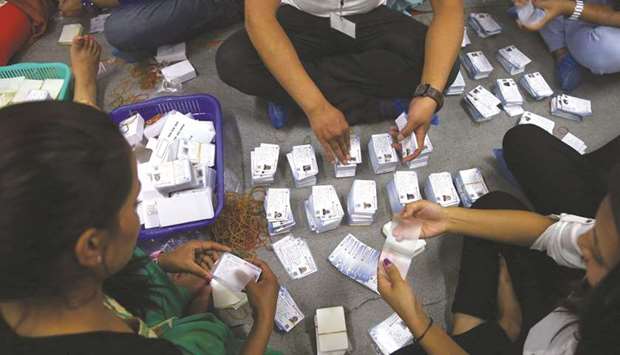“Stage is set for the second round of elections. Voters can now collect ID cards from their respective polling centres now,” said election commissioner Narendra Dahal said.
According to the EC, voters can collect ID cards from their respective polling stations until tomorrow. The election panel has urged the voters to collect cards from their respective polling centres within the given deadline. However, the voters can cast their vote with the help of their citizenship certificate or voter ID card distributed during 2013’s constituent assembly elections as well if they fail to collect the card due to some
reasons.
The EC is conducting the second round of elections in 334 local units of provinces 1, 5 and 7 on June 28. The elections will elect altogether 15,038 representatives including chiefs and members of the rural municipalities and municipalities and their ward committee members. As many as 63,000 leaders from political parties and independent individuals are contesting for the elections.
Election materials such as ballot papers, ballot boxes, voter ID cards, polling screens and other logistics have already been sent to the polling centres while poll officers are preparing to set up election centres, according to the EC.
“Everything is going smoothly. Security arrangement is also fine and political parties including those who have warned of obstructing the polls are busy in poll campaigns,” said another election commissioner Ishwari Paudyal, who is currently in province 5 in course of
monitoring the poll preparations.
Altogether 163,000 security personnel from Nepal police, armed police forced, national investigation department and army have been mobilised for poll security.
With poll preparations completed in all polling centres, the EC has enforced silence hours since yesterday. “Thereby, the parties should suspend poll campaigns and election officers will fix polling centres,” said EC spokesperson Surya Prasad Sharma.
Nepal has also sealed its border with India, to prevent anti-social elements from crossing the international boundary and vitiating
the election atmosphere.
India’s Uttar Pradesh state shares a 599km long open border with Nepal touching seven districts - Pilibhit, Lakhimpur Kheri, Bahraich, Sravasti, Balrampur, Sidhharthnagar and
Maharajganj.
Some Madhes-centric parties have opposed the elections seeking that the constitution is amended to accommodate their demands for more representation in parliament and redrawing of provincial boundaries.
The Nepal government has tabled a new constitution amendment bill in parliament to address the demands of the agitating Madhesis.
Madhesis, mostly of Indian-origin, launched a prolonged agitation between September 2015 and February last year against the implementation of the new constitution which, they felt, marginalised the Terai community.

